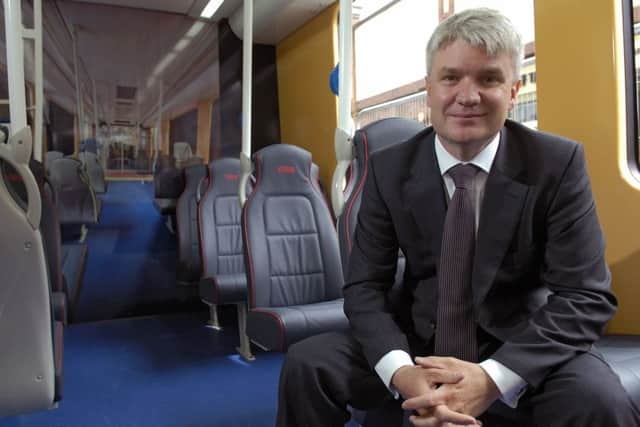Edinburgh Trams lawyer's '˜secret' £50k bonus


The bonus was suspected of being paid into his personal bank account without his firm’s knowledge, a leaked document reveals.
It was also alleged “that certain directors/employees” of the council’s trams company TIE were “incentivised” with bonus payments to negotiate “softer” provisions in the contract.
Advertisement
Hide AdAdvertisement
Hide AdThe Evening News has seen a three-page memo, labelled “highly confidential”, setting out key concerns over the controversial £776 million project which has dogged the Capital’s reputation for years.


The document – which is part of the evidence being considered by the trams inquiry, led by former Lord Advocate Lord Hardie – dates back to November 2010 when the project was in turmoil, with a dispute raging between TIE and the main contractors Bilfinger Berger, leading to delays and cost increases.
Two weeks earlier, TIE chairman David Mackay had quit suddenly, describing the project as “hell on wheels” and branding Bilfinger Berger “delinquent”.
And Audit Scotland had just begun an investigation which was to reach the conclusion three months later that TIE may lack the skills and experience to complete the scheme.
Advertisement
Hide AdAdvertisement
Hide AdThe leaked document was written by Alastair Maclean, then head of legal and administrative services at the city council, to inform the council’s monitoring officer, Jim Inch, director of corporate services, of concerns which had been raised in relation to TIE at the time when the main infrastructure contract for the project was being agreed with the Infraco consortium, made up of Bilfinger Berger and Siemens.


The man raising the concerns was TIE chief executive Richard Jeffrey, who had been appointed to the role in April 2009 and who would announce his departure six months later in May 2011.
Dated November 17, 2010, the document says: “Richard Jeffrey yesterday indicated that he had concerns in relation to events at the time the tram contract with Infraco was entered into.”
It says the events “require to be investigated” and then outlines several points.
There is a suspicion that:
Advertisement
Hide AdAdvertisement
Hide Adn Certain directors/employees of TIE were incentivised to negotiate a concluded deal with Infraco at a certain “headline rate”;
n In order to achieve that headline rate and receive bonus payments, other “softer” provisions were agreed;
n Those other provisions may have been agreed with or without the collusion of Infraco;
n Andrew Fitchie, partner of DLA who had been seconded to TIE, was paid a “thank you” payment or bonus after completion of contract into his personal bank account without the knowledge of DLA;
Advertisement
Hide AdAdvertisement
Hide Adn The contract was defective in a number of respects which may or may not be as a result of such incentivisation or negligence;
n The closing report which was prepared by TIE for the council – which was providing a financial guarantee – was materially incorrect;
n That “misrepresentation” could be innocent, negligent or fraudulent.
The document also says that Mr Jeffrey raised the question of Mr Fitchie’s bonus payment with DLA.
Advertisement
Hide AdAdvertisement
Hide AdAnd it continues: “It is suspected that DLA will have put their PI [professional indemnity] insurers on notice and [Richard Jeffrey] has indicated that there is a feeling of the ‘shutters coming down’ with DLA trying to distance themselves from [Andrew Fitchie], He also indicated that no-one [the implication being neither TIE nor DLA] can make contact with [Andrew Fitchie].”
The memo says Mr Jeffrey had engaged legal firm Anderson Strathern to advise him “either in his personal capacity or as a director” in relation to his legal obligations to TIE, the potential obligation to report a fraud to the Serious Fraud Office (SFO) and carrying out an investigation into the matter.
“Initial indications from AS at this stage are that he has no duty to report this matter to the SFO,” the document adds.
It is understood that after further investigation Anderson Strathern concluded there was no evidence of criminal behaviour, but observed it was highly unusual for a lawyer negotiating a contract to get a bonus.
Advertisement
Hide AdAdvertisement
Hide AdThe payment of a £50,000 bonus to Mr Fitchie was reported by the Evening News on July 9, 2011, along with details of payments made to a string of legal and public relations firms.
The figures, obtained under Freedom of Information laws, showed TIE had spent more than £5m since 2008 on lawyers and spin doctors.
But there was no suggestion at the time that Mr Fitchie’s payment had been for him completing the contract or that it was made without his firm’s knowledge.
The Infraco contract was finally signed in 2008, but sources have said there was a drive the previous year to get the deal agreed as quickly as possible because of the new SNP government – elected in May 2007 – and its known opposition to the tram project.
Advertisement
Hide AdAdvertisement
Hide AdOpposition parties combined to block the SNP’s attempt to scrap the trams. But another TIE project, the Edinburgh Airport Rail Link, was cancelled in September 2007.
Mr Jeffrey, who now runs camper van hire company Motorhome Adventure Scotland, based in Kinross, did not want to discuss the concerns he had raised.
He said: “There is a public inquiry going on. I will say what I need to say at the inquiry and I’m not making any comment about anything before that.”
A DLA Piper spokeswoman said: “It would be inappropriate for us to comment at this stage. The firm is co-operating fully with the inquiry and will continue to do so in order to assist it in fulfilling its remit and purpose.”
Mr Fitchie did not respond to an invitation to comment.